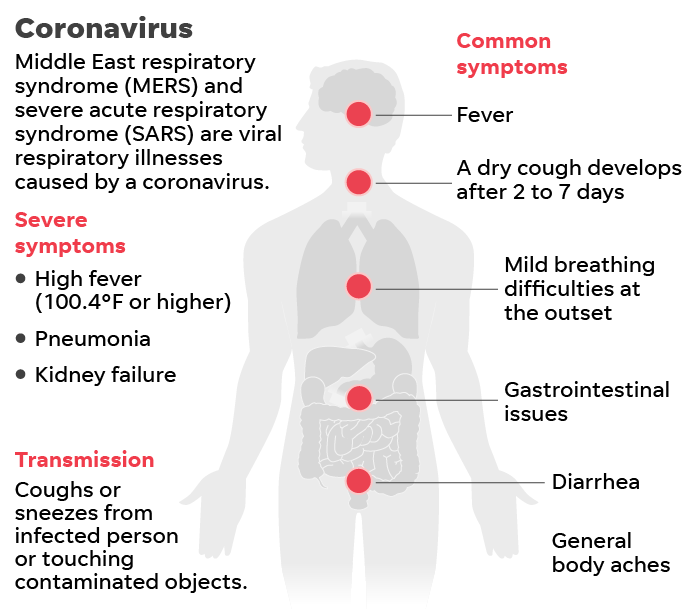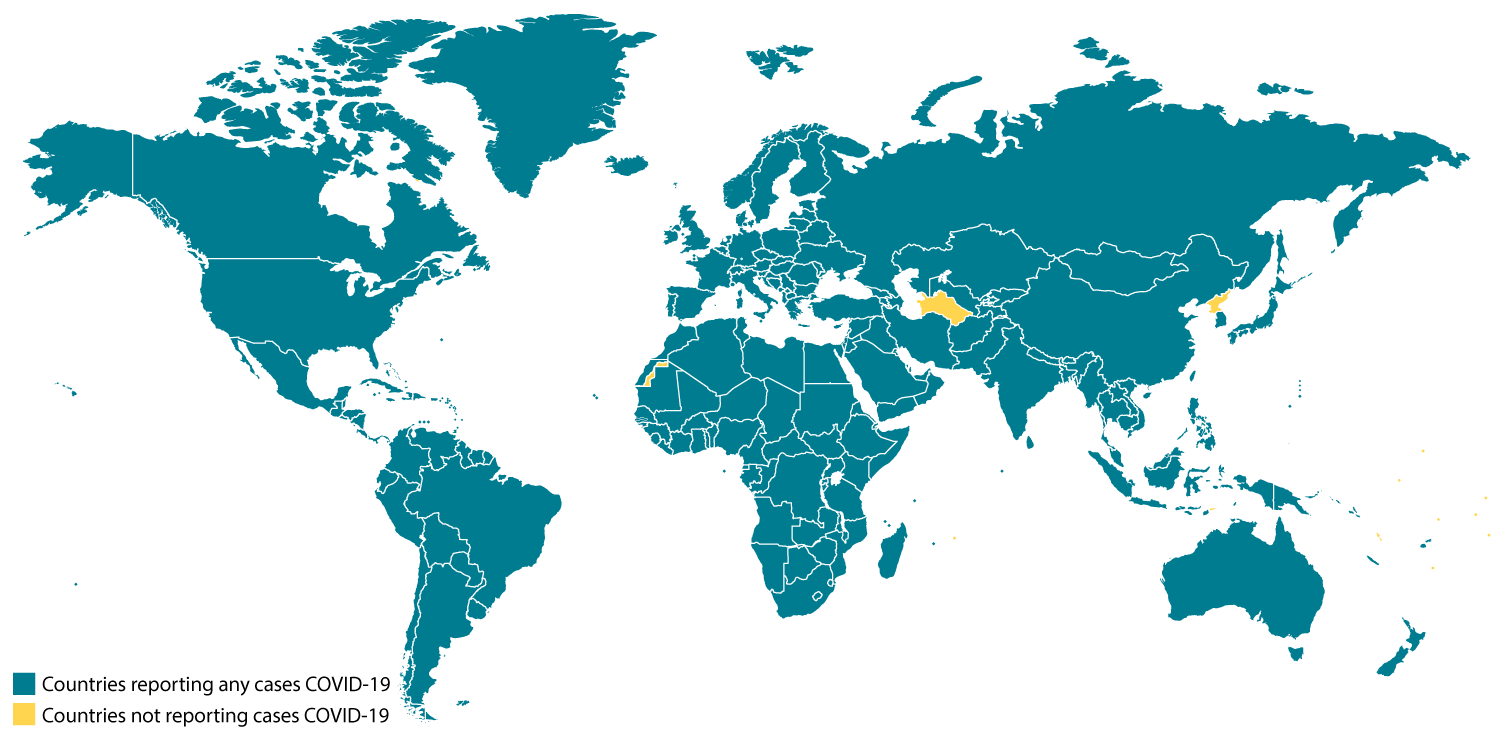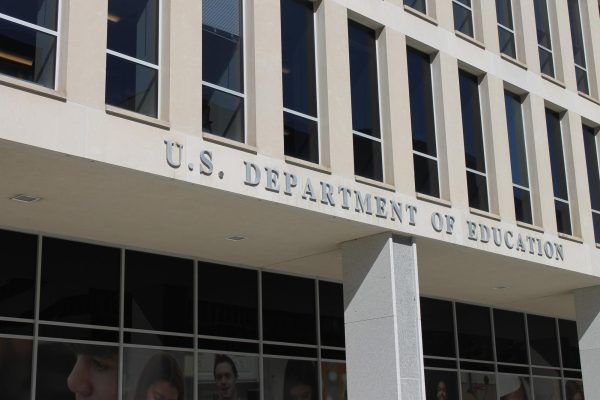Coronavirus: Pandemic of the Decade

It is impossible not to have heard of the virus of epic proportions that has gripped the nation and the world: the coronavirus.
Life has changed forever in a country, a world, that never stops running. Schools are closed, business shut down, sporting events – including the 2020 Summer Olympics – are cancelled, millions of people are quarantined; this is the new normal.
To understand the effects of the virus, one must first fully comprehend its origin and nature.
The coronavirus is part of a family of viruses which also shares the same name. These viruses usually infect bats, pigs, and small mammals, but are known to adapt and quickly mutate, enabling them to spread among humans as well as animals.
Formally named SARS-COV-2, the virus causes the disease COVID-19. The CO comes from corona, the VI from virus, and the D from disease. In humans, the virus initially infects the lower respiratory track.
While symptoms vary from patient to patient, many experience a mild fever, coughing, vomiting, diarrhea, and shortness of breath leading to complications with pneumonia. Patients can experience varying degrees of the virus, before or after diagnosis. In fact, many people can transmit the disease while being asymptomatic.
In research of 44,672 cases in China, 81% exhibited mild symptoms, about 13% were severely ill and 4.7% were critically ill. The people who eventually succumbed to the virus all belonged to the third category.
It is extremely difficult to regulate the course of something directed by nature. But there are a series of precautions that people can take to reduce their likelihood of contracting the virus.
The virus, which can be contracted if an infected person coughs or sneezes, spreads through the ingestion of minuscule respiratory droplets. On average, an infected person has spread the disease to at least 2.6 people.
Wearing masks can be effective if the mask was manufactured by an independent, dependable agency. However, since the water droplets are impossibly small, wearing a mask does not ensure that a person is protected from the virus.
It has been found that washing hands is the best way to prevent the spread of the virus, especially if done multiple times a day. It is imperative to be hygienic; using hand sanitizer, refraining from touching the face, as well as washing your hands can be very effective.
It is also very important to keep up with flu shots and vaccinations, which can also help prevent the virus although an official cure has not yet been found.
While the mortality rate for the disease is only 2-3.4% (Ebola’s mortality rate was around 10%), the numbers are continuously changing. However, there are several factors which increase the risk of contracting the virus.
The virus is most likely to strike the older members of society as well as those who have other diseases, such as diabetes.
In a study conducted by the Chinese Center for Disease Control and Prevention, it was found that most of the 1023 infected people in the study were aged 60 or older. Of those who were 80 and older, the mortality rate was 14.8%, ages 70 to 79 was 8%. When compared with the 2.3% mortality rate of the total population, these numbers are particularly high.
While children tend to be targets for such viruses, there have been relatively few reports of children contracting the coronavirus. However, this is starting to change as cases of COVID-19 grows in young adults.
There is simply no telling what this pandemic might bring.
A pandemic is defined as a virus or disease which has a presence in two or more continents. Since its origination in Wuhan, China during December of last year, there have been 395,00+ cases-in six continents- of the virus, classifying it as a pandemic. CNN says that the coronavirus has killed approximately 17,241 people worldwide (as of March 24th).
After its inception in Wuhan, the virus has led to extensive quarantines on cruise ships and lockdowns at resorts. However, this has not stopped the spread of the virus; cases of the COVID-19 disease have been exhibited in 109 different countries, including the United States.
As of March 24, the CDC says that there have been a total of 43,000 cases of the coronavirus in America, with 547 deaths. The government has established a variety of traveling restrictions to prevent further infection. President Trump has restricted over international travel from over 26 European countries for the next 30 days, which started on March 13 at midnight.
Obviously, travelling restrictions are not the only negative effects of the coronavirus.
Aside from the threat posed to humankind by a complete, worldwide pandemic, the coronavirus has also had disastrous effects on the stock market. Economists say that the stock markets have had one of the worst weeks since the financial crisis of 2008.
World economies are suffering as well.
The Chinese travel the most- 150 million passports- and since many popular cruise lines, resorts, and other popular vacationing entertainment companies have banned entry of people who were in China in the past two weeks (at least until the end of March), the travel industry has lost millions of dollars in revenue.
Of course, these actions cannot be avoided; a pandemic is a pandemic. But they are not ideal and will devastate the economy to the point where years of recovery are inevitable.
The coronavirus has escalated very quickly.
Just over a month ago, it was something that people made memes and laughed about, oblivious to the fact that it was only a cruise ship away. Now, it has progressed to the point where all 50 US states are affected.
The virus hits everyone, regardless of social status. Even Tom Hanks, a prominent Hollywood actor, was infected along with his wife, Rita Wilson, while the couple were filming for a movie in Australia.
While members of the CB South community are yet to be infected, it is better to be prepared for the worst. Online schooling – distance learning – has taken effect in order to keep students connected. All public schools in Pennsylvania will be closed until at least April 6.
Even colleges, including the University of Pennsylvania, Yale, and Columbia have said that the rest of the semester will be complete online. Many local colleges, such as Villanova, St. Joe’s, and Temple, have also announced online schooling.
While COVID-19 cannot be stopped on its path of destruction, it can be controlled. And even though the government can protect its citizens to an extent, the safety of each individual person is their own responsibility.
A month ago, no one would have imagined that schools would be shut down for the year. But within the course of a week, the world has turned upside-down, and there is more to come. Brazil and Ireland have recently reported their first cases of the coronavirus; it won’t be long until more countries do the same.
It’s scary, but it’s the truth.
The virus is right around the corner. So the choice is yours: play it safe and wash your hands, or risk getting the coronavirus.







